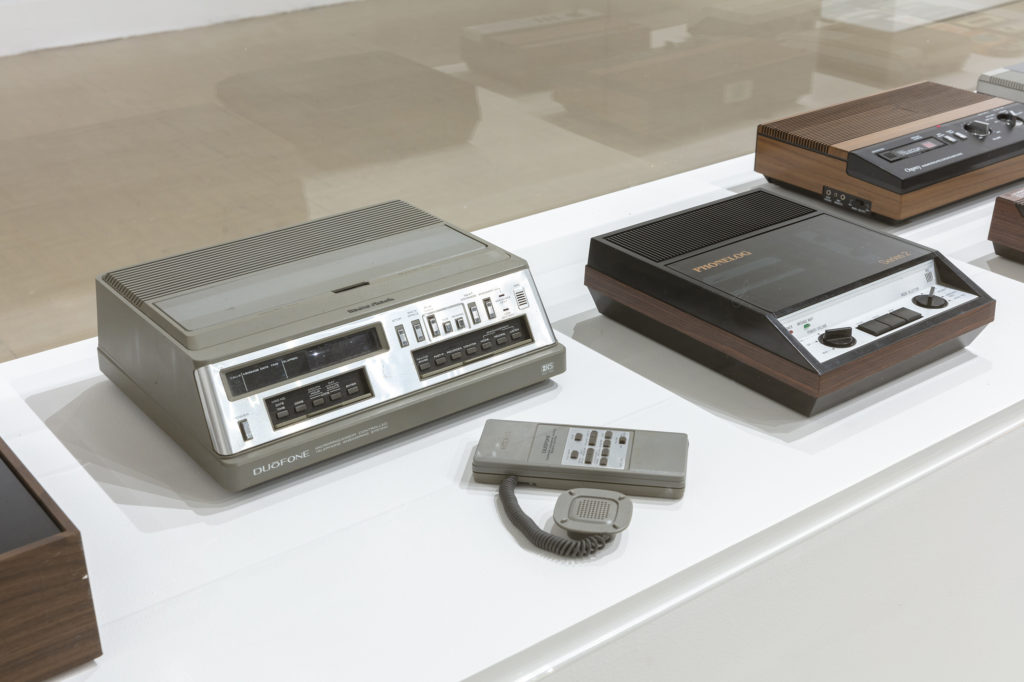Novelist Catherine Robertson responds to Susan Schuppli’s work Listening to Answering Machines (2015) in our exhibition Eavesdropping.
I had to Google Susan Schuppli, which is a form of spying, of course, because sometimes you can find out things about people online that are not on their official websites. I’m never interested in official websites and only go to Wikipedia entries to find out someone’s height and whether they were in the thing I thought I recognised them from.
I have not Googled the owner of one of the answering machines, Charles McParland—or it could be McFarland—old tapes and Canadian accents are a bit fuzzy. I only listened to the tape loop for a few minutes but I caught the message saying he was going to be invited to stand for some kind of office. If I’d listened longer, I might have known if Charles agreed, and if he got voted in.
But I had to leave because I had to go listen elsewhere. I’m writing a novel that’s based on a true story and I’m interviewing people who were involved.
One of those people is my husband. We’ve been together thirty years, so I know him pretty well, but I’ve been worried about how this process is going to go. I’ve interviewed a lot of people for various publications—a lot of writers; I had a phone conversation with Kamila Shamsie while she was in Karachi and it cost me $98, which I didn’t find out until it was too late to bill it on.
I’m good at getting information out of people because even though I talk a lot, I’m also a good listener and I’m genuinely interested in what people have to say. I think it’s because I had a very sheltered, insular childhood, so I still find the world outside and other people’s lives fascinating.
But when the life is that of someone you know intimately, the interview process is not so easy. There’s more responsibility. There are ethics. I wonder if Charles McParland/Farland or any of his family knows that Susan Schuppli has his messages on a public loop? I worry about that and I am not Charles or any of his family.
I worry that I might be asking my husband to retrieve memories that he isn’t comfortable revisiting. What do I have a right to ask him? What do I have a right to use? Will the writer in me revel in ‘good material’ and forget that there are real people involved and that I’m married to one of them.
I’ll be interviewing at least ten other people. I worry about being able to do their stories justice when I come to weave them into a whole novel. I worry about deciding what to leave in and what to leave out in the cause of narrative fluency. I have not even begun to draft an outline of this novel yet, and I feel its weight.
Last night, I switched my recording device on when my husband and one of my other interviewees were talking. They didn’t know I was spying on them, not until afterwards. I learned for the first time that one of the key characters in the story had the nickname Nutsy, because he used to scratch his nuts all the time. ‘You can’t print that’, they said. ‘He hated that.’
Such good material, though.
PS: I lied before. I did Google Charles McParland and Charles McFarland, just in case, and I only found one who was interesting, so I’m going to pretend it’s the guy with the answering machine and tell you about him:
• He was born in Uffington, Muskoka and he remained all his life a dedicated and supportive churchman with the United Church of Canada.
• He maintained an active interest in his Masonic Lodge for over half a century and was a member of the Harcourt Lodge, the Scottish Rite and Rameses Shrine.
• His consuming interest was golf and he enjoyed being a member of the Mississaugua Golf and Country Club for almost three quarters of his life.
Good material …
—Catherine Robertson
Catherine Robertson’s six novels have all been number-one New Zealand bestsellers. She has an MA in Creative Writing from Victoria University’s International Institute of Modern Letters, reviews for the Listener, and is a regular guest on RNZ’s The Panel and on Jesse Mulligan’s Book Critic slot. She is on the Verb Wellington board and the Book Awards Trust. Her latest novel is What You Wish For.
This piece was written for and read during Tuatara Open Late as part of a Lit Crawl taster session in which four writers responded to Eavesdropping. The others were Nikki-Lee Birdsey, Annaleese Jochems, and Ruby Solley.



